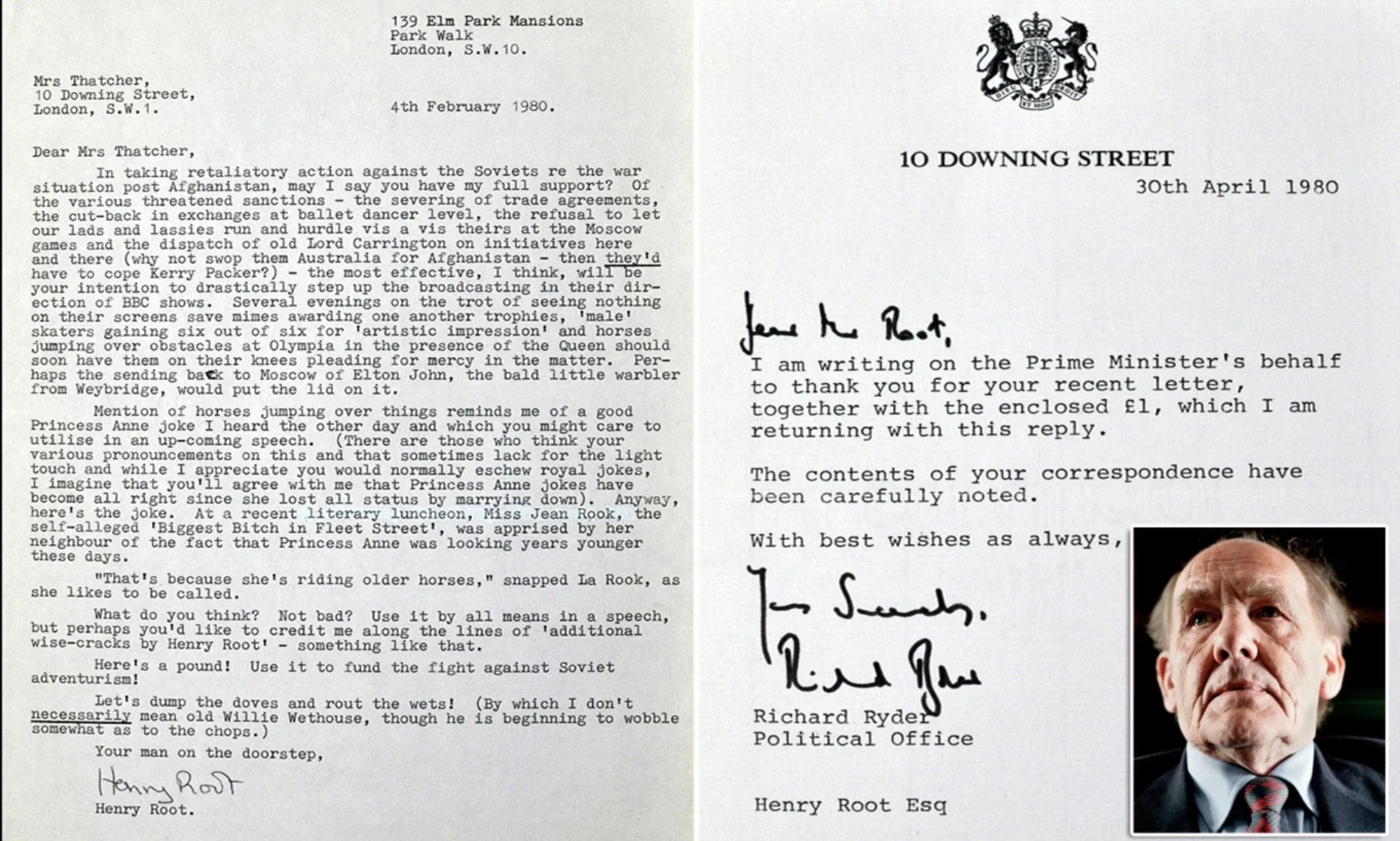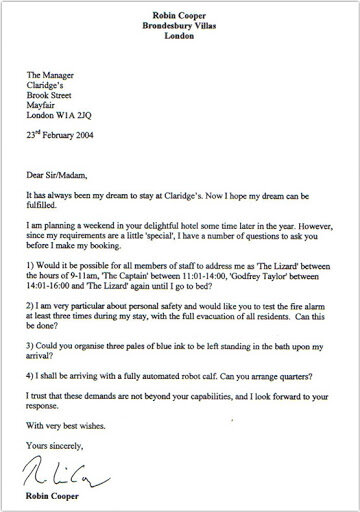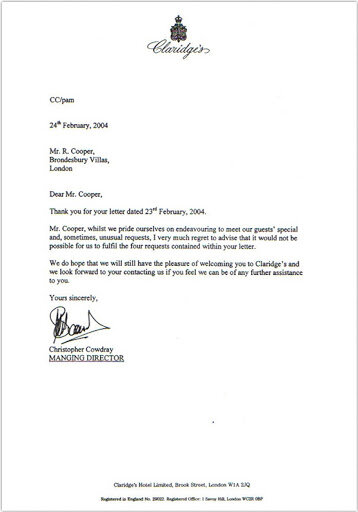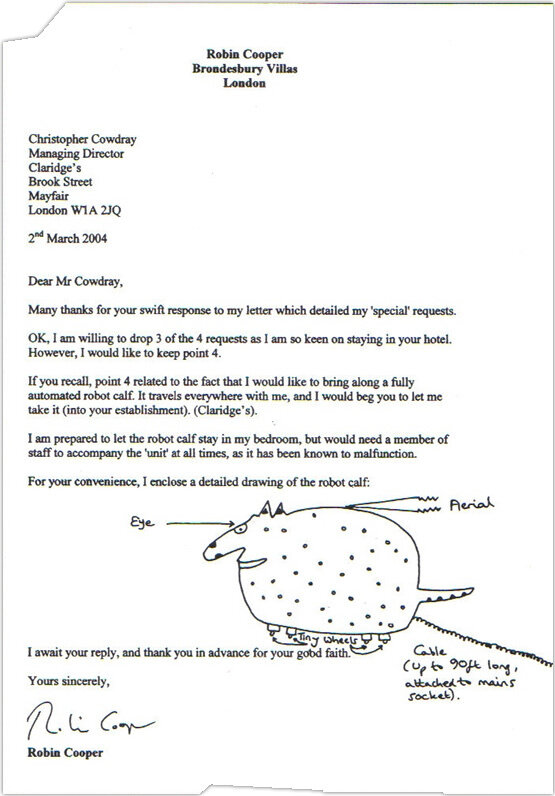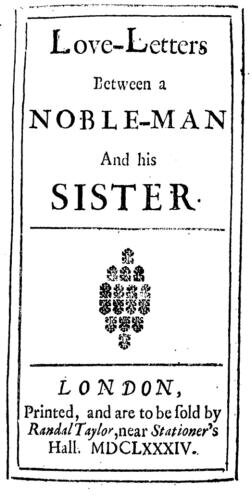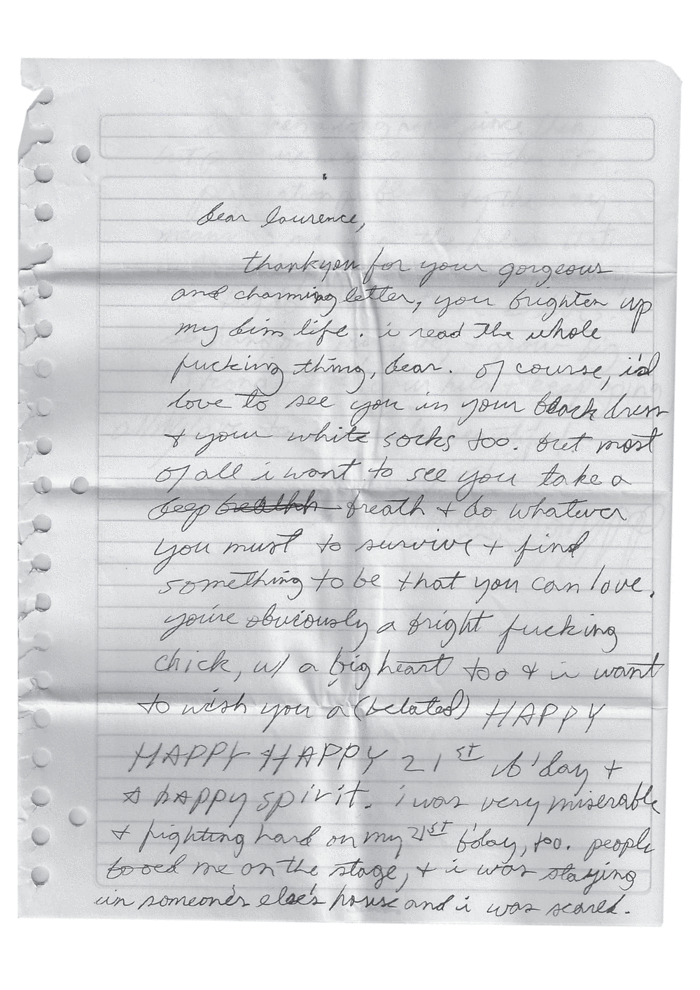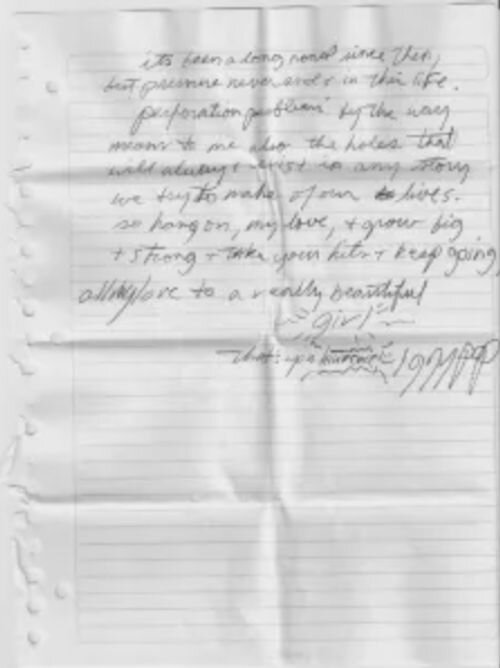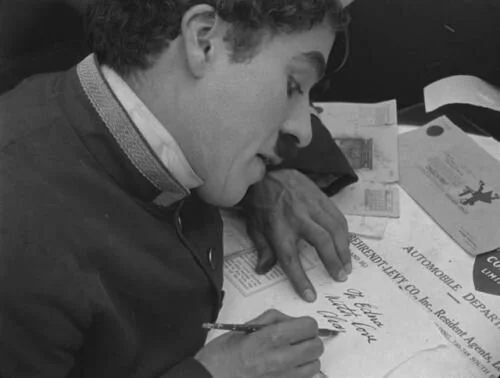By The Landlord
“Letter writing is the only device for combining solitude with good company. One of the pleasures of reading old letters is the knowledge that they need no answer.” ~ Lord Byron
"More than kisses, letters mingle souls." ~ John Donne
“Open me carefully.” ~ Emily Dickinson, Selected Letters
“I have only made this letter longer because I have not had the time to make it shorter." ~ Blaise Pascal (Letter 16, 1657)
“Their correspondence was something like a duet between a tuba and a piccolo." ~ from Look Homeward: A Life of Thomas Wolfe by David Herbert Donald
"Don't you like to write letters? I do because it's such a swell way to keep from working and yet feel you've done something." ~ Ernest Hemingway
This is the Night Mail crossing the Border,
Bringing the cheque and the postal order,
Letters for the rich, letters for the poor,
The shop at the corner, the girl next door …
Letters of thanks, letters from banks,
Letters of joy from girl and boy,
Receipted bills and invitations
To inspect new stock or to visit relations,
And applications for situations,
And timid lovers' declarations,
And gossip, gossip from all the nations,
News circumstantial, news financial,
Letters with holiday snaps to enlarge in,
Letters with faces scrawled on the margin,
Letters from uncles, cousins and aunts,
Letters to Scotland from the South of France,
Letters of condolence to Highlands and Lowlands,
Written on paper of every hue,
The pink, the violet, the white and the blue,
The chatty, the catty, the boring, the adoring,
The cold and official and the heart's outpouring,
Clever, stupid, short and long,
The typed and the printed and the spelt all wrong.
... And none will hear the postman's knock
Without a quickening of the heart.
For who can bear to feel himself forgotten? ~ W.H. Auden, Night Mail
Dear Friends, Readers, Music Lovers and Bar Patrons,
It was once a vital heartbeat of daily life, a primary line of curving detail, the carrier of important administration, of general, or personal news, or deep, unfolding, all-enveloping emotion. Slow and steady, but meaningful, and keepable – some are now history's preserved, beautiful leaves. Under candlelight, they could be the learned fusion of wit, skill and quill, but even with later forms of pen, ballpoint and more, and slightly faster lives, ink required that before words formed, its writer would, at least for a moment, need to think.
It seems like another lifetime when letter writing was a daily thing, but it included up to the first 20 years of mine, and I'm not even all that old. They came in all kinds – to friends or relatives, thank-yous to how-are-yous, to penpals, and even perfumed love letters from early girlfriends. An expansion came when I hitch-hiked and Inter-railed around Europe as a teenager a couple of times and would come back with a fistful of addresses of new acquaintances from other places, leading to a period of thin-paper airmail arrival and departure. Even postcards, obligatory to send home if travelling, required a little bit of thought. Nothing was instant, everything far more imagined and therefore intense. Business and pleasure, love and rejection, many of life's highs and lows were heralded by a paper envelope with a stamp or a seal.
So this week our song theme is written correspondence. It doesn't necessarily have to come in letter form – telegrams and other messages, even emails could count, but full words have to come into play. But for the purposes of songwriting, the letter, written or received, replied to or ignored, lost or cherished, is a fabulous device for storytelling and tension, expectation and the focus for emotion. And ironically, in the age of Covid, correspondence in different forms, including for collaborative songwriters, is perhaps returning in new forms.
Letters in songs might mention or quote correspondence in any situation, such as expressing hope for responses, wondering when it might arrive, pore over something received, or ponder about how to write a difficult reply. They might include lyrics that echo certain phrases of the formal, or informal writing style, from Dear Sir/Madam, to sincerely or faithfully yours, regards, P.S., or cliches of thanks, rejection, complaint or expressions of feeling, from 'Thank you for your letter of' to 'We regret to inform you' to 'I would appreciate if' to 'I am contacting you because', 'I am writing to complain' to 'Having seen your advertisement' to 'After careful consideration'. Phrases of formality are useful tools to subvert or frame a song or title.
At the Song Bar, there's an ever increasing amount of correspondence as more and more visitors come to peruse our many treasures of current and past playlists, themes, obscure words, to round-ups of new albums and songs. Often it's appreciative and wonderful, but the vast majority is in reference to music sent by emerging artists, or from the publicity arm of established artists wishing to give their work extra exposure. It's a lot to keep up with. Much of it is welcome, some of it not at all suitable or any good. It's hard not to get gripped by a John Peel-inspired fever to try to listen to and reply to everything, but to correspond fully is nigh on impossible.
But sometimes the correspondence is downright strange, and this example I'm about to give, without the name, obviously, is an example of an increasing trend of trigger-finger brainlessness and desperate need for internet exposure. It came after I wrote a short Song of the Day entry for the band Tennis. Some weeks later, I received several emails from some guy who ran his own, amateur tennis website, as in playing with rackets and balls. He was desperately keen to share mutual links and continually took a shot at it, and really pressed for this without taking notice of my initially polite replies explaining that one is a music site, the other about practising the ball game. Despite this, his artificially enthusiastic emails continued, generally of this nature:
'Hi! I love your article about tennis ... My team actually just published a comprehensive article on "Tennis Tips for Beginners: Play Like a Pro" which I think your visitors would truly appreciate and add value to your awesome article. Blah blah blah ...
Anyway, here is my eventual, exasperated reply ...
Dear ….
Thank you for your email. Have you actually read what that 'amazing' Tennis article is about? Or do you just live in a clickbait fantasy world where editorial relevance has no bearing at all?
Nothing against the ball game, obviously, but such emails as yours would benefit from a little topspin of intelligence and a tiny slice of research.
Back at you, with a whipped backhand,
And best wishes,
The Song Bar.
The language of promotion and PR and promotion exasperates me continually, and I’m like a coiled snake waiting to bite if this sort of stuff arrives. But some make it into a career and an artform. Henry Root is the creation of writer William Donaldson who, in the Henry Root Letters wrote to numerous public figures with unusual or outlandish questions and requests. Here’s a bizarre, horse-themed cantering one he sent to the prime minister, Margaret Thatcher about Russia, Afghanistan and the Olympics, with a pound donation in 1980, with the reply.
Henry Root to Margaret Thatcher, 1980
The Henry Root letters no doubt inspired 2004’s The Timewaster Letters by Robin Cooper, the pen name of comedy writer, producer and all-round hoaxer Robert Popper, whose targets were mostly expose the absurdity of the PR and service industry, testing its formalities to its limits. as well as replying at length to wind up invitations from Nigeria and other places seeking to launder money. Here is one bizarre example to Claridge’s Hotel:
But letter writing has long between an artform as the building block of many great epistolary novels, formed of documents, but largely correspondence. This includes one the the first in English, Aphra Behn's Love-Letters Between a Nobleman and His Sister, which appeared in three volumes in 1684, 1685, and 1687, novel pioneer Samuel Richardson with Pamela (1740) and Clarissa (1749), John Cleland's early erotic novel Fanny Hill (1748), Mary Shelley's Frankenstein (1818) and Bram Stoker’s Dracula (1897). As also in song, using this form becomes a framing device, and source of clashing perspectives and irony, the reader being able to see within and beyond the knowledge of the letter writer and narrator themselves in different layers. Here though is Aphra Behn with her pioneering publication:
One of the more striking is C.S Lewis’s The Screwtape Letters, a Christian-perspective parody written for the amusement of JRR Tolkien, in which a senior devil, Screwtape, holds an administrative post in the bureaucracy ("Lowerarchy") of Hell, writing to and acting as a mentor to his nephew Wormwood, an inexperienced (and incompetent) tempter on the nature of human virtue and vice.
But while the title of this introduction is designed as a musical play on words, Letters of Note – is also a fabulous resource, collected by blogger Shaun Usher, in website and book form, as source of correspondence by people famous or otherwise from all walks of life, and covering every aspect and circumstance in life. It includes informal letters between heads of state and royalty, pop stars and film stars, soldiers in war and loved ones and much more, such as Groucho Marx’s sporadic exchange with Woody Allen throughout the 1960s as a budding young comedian.
From here it’s possible to unearth many treasures, and will no doubt include great correspondence by famous musicians, from Mozart writing to his wife Constanze: “An astonishing number of kisses are flying about! I see a whole crowd of them… I kiss you millions of times.”
Robert Schumann writing to his wife and great musical partner, the brilliant pianist Clara: “You are my right hand and you, you must take care of yourself so that nothing happens to you.”
Beethoven writing, in 1812, to what some scholars believe was the Countess Josephine von Brunsvik: “My thoughts go out to you, my immortal beloved… I can live only wholly with you or not at all…”
And here’s Johnny Cash, writing to his beloved June Carter:
Johnny Cash to his wife June Carter Cash
And then there’s this, in an altogether different style, by Jimi Hendrix to a female acquaintance.
Jimi Hendrix to a female friend, lover or fan
The Hendrix letter may have just been to a fan, but the context doesn’t always have to be sexual. In 1995 Iggy Pop received a letter from French female fan, Laurence, who wrote about a difficult upbringing, asking for advice, and ”being the child of an acrimonious divorce with a string of social workers, lawyers, greedy estate agents and bailiffs at the door, the fear, the anger, the frustration, the love”. Here’s Iggy’s passionate supportive reply, several months later, which she received the day before she and her family were evicted from their home:
Fans fear rejection most of all, and that is a whole other area which songs can explore, but there can be funny rejection letters such as this one from the legendary Al Feldstein, to a wannabe contributor to MAD magazine.
Madcap rejection letter
This week then our tables are very full with visitors and the endless sound of pens scribbling, all wishing to write more about the subject. Here’s Muriel Spark summing it up:
“The letters of famous people can be placed into two categories: there is the type of letter which becomes itself a valuable contribution to literature through its wit, style or wisdom; another kind is that whose main importance lies in the provision of a background to their author's life. Especially in the correspondence of great writers and poets, these two factors are very often combined.”
And here’s Virginia Woolf with her copy of Jacob's Room:
“Let us consider letters - how they come at breakfast, and at night, with their yellow stamps and their green stamps, immortalised by the postmark - for to see one's own envelope on another's table is to realise how soon deeds sever and become alien. Then at last the power of the mind to quit the body is manifest, and perhaps we fear or hate or wish annihilated this phantom of ourselves, lying on the table. Still, there are letters that merely say how dinner's at seven; others ordering coal; making appointments. The hand in them is scarcely perceptible, let alone the voice or the scowl. Ah, but when the post knocks and the letter comes always the miracle seems repeated - speech attempted. Venerable are letters, infinitely brave, forlorn, and lost.”
“Indeed,” adds Lewis Carroll. “The proper definition of a man is an animal that writes letters.”
The great comedy writer and performer Spike Milligan is also here, adding a whole new perspective: “Unbeknown to me, my manager, under my very nose (in a crouching position) has all these years been secretly compiling a book from my correspondence. I often wondered what she was doing in my office. She never did a stroke of work for me. All the time, I have been working for her.”
Two former US presidents are also sitting at a table. "Never let your correspondence fall behind,”advises. Abraham Lincoln. George Washington agrees. “To acknowledge the receipt of letters is always proper, to remove doubts of their miscarriage.”
Some letter writing pressures also reveal things about famous persons’ lifestyles. Here’s Charlie Chaplin, from his 1964 autobiography: "There comes a moment in the day when you have written your pages in the morning, attended to your correspondence in the afternoon, and have nothing further to do. Then comes that hour when you are bored; that’s the time for sex.”
From a 1915 film, Charlie Chaplin doing his correspondence
Another advantage of the letter, once you’d got it done, is geography. “To send a letter is a good way to go somewhere without moving anything but your heart,” says Phyllis Theroux
Letters are also a great learning tool for writers. David Nicholls tells us: “I think I became a writer because I used to write letters to my friends, and I used to love writing them. I loved the idea that you can put marks on a page and send it off, and two days later, someone laughs somewhere else in the world.”
But now it’s time to turn to songs. In another time, far away, but registered on sister catalogue site, the Marconium, another good writer picked 10 songs about letters and emails several years ago, but there are hundreds more to pick out. Here are some contrasting, but more obvious ones to inspire, but, because correspondence is always a considered form, no doubt which you’ll prefer to leave to a potential B-list as they spring to mind too quickly, and there are always other versions
So then, it’s time to turn your over to this week’s distinguished man of letters, the marvellous Maki! Please place your correspondence-based and inspired songs in comments below, for deadline on Monday evening (11pm UK time) for playlists published on Wednesday.
Yours musically, lyrically, and faithfully,
Your friendly Landlord
New to comment? It is quick and easy. You just need to login to Disqus once. All is explained in About/FAQs ...
Fancy a turn behind the pumps at The Song Bar? Care to choose a playlist from songs nominated and write something about it? Then feel free to contact The Song Bar here, or try the usual email address. Also please follow us social media: Song Bar Twitter, Song Bar Facebook. Song Bar YouTube. Subscribe, follow and share.
Please make any donation to help keep Song Bar running:


